- Home
- Evelyn Waugh
A Handful of Dust Page 2
A Handful of Dust Read online
Page 2
“About quarter of an hour ago, sir.”
“Then I’ll have breakfast in her room.”
He put on his dressing gown and slippers and went through into Guinevere.
Brenda lay on the dais.
She had insisted on a modern bed. Her tray was beside her and the quilt was littered with envelopes, letters and the daily papers. Her head was propped against a very small blue pillow; clean of make-up, her face was almost colorless, rose-pearl, scarcely deeper in tone than her arms and neck.
“Well?” said Tony.
“Kiss.”
He sat by the tray at the head of the bed; she leaned forward to him (a nereid emerging from fathomless depths of clear water). She turned her lips away and rubbed against his cheek like a cat. It was a way she had.
“Anything interesting?”
He picked up some of the letters.
“No. Mama wants nanny to send John’s measurements. She’s knitting him something for Christmas. And the mayor wants me to open something next month. I needn’t, need I?”
“I think you’d better, we haven’t done anything for him for a long time.”
“Well, you must write the speech. I’m getting too old for the girlish one I used to give them all. And Angela says, will we stay for the New Year?”
“That’s easy. Not on her life, we won’t.”
“I guessed not… though it sounds an amusing party.”
“You go if you like. I can’t possibly get away.”
“That’s all right. I knew it would be ‘no’ before I opened the letter.”
“Well, what sort of pleasure can there be in going all the way to Yorkshire in the middle of winter?”
“Darling, don’t be cross. I know we aren’t going. I’m not making a thing about it. I just thought it might be fun to eat someone else’s food for a bit.”
Then Brenda’s maid brought in the other tray. He had it put by the window seat, and began opening his letters. He looked out of the window. Only four of the six church towers were visible that morning. Presently he said, “As a matter of fact I probably can manage to get away that weekend.”
“Darling, are you sure you wouldn’t hate it?”
“I daresay not.”
While he ate his breakfast Brenda read to him from the papers. “Reggie’s been making another speech… There’s such an extraordinary picture of Babe and Jock… a woman in America has had twins by two different husbands. Would you have thought that possible?… Two more chaps in gas ovens… a little girl has been strangled in a cemetery with a bootlace… that play we went to about a farm is coming off.” Then she read him the serial. He lit his pipe. “I don’t believe you’re listening. Why doesn’t Sylvia want Rupert to get the letter?”
“Eh? Oh well, you see, she doesn’t really trust Rupert.”
“I knew it. There’s no such character as Rupert in the story. I shall never read to you again.”
“Well, to tell you the truth I was just thinking.”
“Oh.”
“I was thinking how delightful it is, that it’s Saturday morning and we haven’t got anyone coming for the weekend.”
“Oh, you thought that?”
“Don’t you?”
“Well, it sometimes seems to me rather pointless keeping up a house this size if we don’t now and then ask some other people to stay in it.”
“Pointless? I can’t think what you mean. I don’t keep up this house to be a hostel for a lot of bores to come and gossip in. We’ve always lived here and I hope John will be able to keep it on after me. One has a duty towards one’s employees, and towards the place too. It’s a definite part of English life which would be a serious loss if…” Then Tony stopped short in his speech and looked at the bed. Brenda had turned on her face and only the top of her head appeared above the sheets.
“Oh God,” she said into the pillow. “What have I done?”
“I say, am I being pompous again?”
She turned sideways so that her nose and one eye emerged. “Oh no, darling, not pompous. You wouldn’t know how.”
“Sorry.”
Brenda sat up. “And, please, I didn’t mean it. I’m jolly glad too, that no one’s coming.”
(These scenes of domestic playfulness had been more or less continuous in Tony and Brenda’s life for seven years.)
*
Outside, it was soft English weather; mist in the hollows and pale sunshine on the hills; the coverts had ceased dripping, for there were no leaves to hold the recent rain, but the undergrowth was wet, dark in the shadows, iridescent where the sun caught it; the lanes were soggy and there was water running in the ditches.
John Andrew sat on his pony, solemn and stiff as a Life-Guard, while Ben fixed the jump. Thunderclap had been a present on his sixth birthday from Uncle Reggie. It was John who had named her, after lengthy consultation. Originally she had been called Christabelle which, as Ben said, was more the name for a hound than a horse. Ben had known a strawberry roan called Thunderclap who killed two riders and won the local point-to-point four years running. He had been a lovely little horse, said Ben, till he staked himself in the guts, hunting, and had to be shot. Ben knew stories about a great many different horses. There was one called Zero on whom he had won five Jimmy-o-goblins at ten to three at Chester one year. And there was a mule he had known during the war, called Peppermint, who had died of drinking the company’s rum ration. But John was not going to name his pony after a drunken mule. So in the end they had decided on Thunderclap, in spite of her imperturbable disposition.
She was a dark bay, with long tail and mane. Ben had left her legs shaggy. She cropped the grass, resisting John’s attempts to keep her head up.
Before her arrival riding had been a very different thing. He had jogged round the paddock on a little Shetland pony called Bunny, with his nurse panting at the bridle. Now it was a man’s business. Nanny sat at a distance, crocheting, on her camp stool; out of earshot. There had been a corresponding promotion in Ben’s position. From being the hand who looked after the farm horses, he was now, perceptibly, assuming the air of a stud groom. The handkerchief round his neck gave place to a stock with a fox-head pin. He was a man of varied experience in other parts of the country.
Neither Tony nor Brenda hunted but they were anxious that John should like it. Ben foresaw the time when the stables would be full and himself in authority; it would not be like Mr. Last to get anyone in from outside.
Ben had got two posts bored for iron pegs, and a whitewashed rail. With these he erected a two-foot jump in the middle of the field.
“Now take it quite easy. Canter up slow and when she takes off lean forward in the saddle and you’ll be over like a bird. Keep her head straight at it.”
Thunderclap trotted forwards, cantered two paces, thought better of it and, just before the jump, fell into a trot again and swerved round the obstacle. John recovered his balance by dropping the reins and gripping the mane with both hands; he looked guiltily at Ben, who said, “What d’you suppose your bloody legs are for? Here take this and just give her a tap when you get up to it.” He handed John a switch.
Nanny sat by the gate re-reading a letter from her sister.
John took Thunderclap back and tried the jump again. This time they made straight for the rail.
Ben shouted “Legs!” and John kicked sturdily, losing his stirrups. Ben raised his arms as if scaring crows. Thunderclap jumped; John rose from the saddle and landed on his back in the grass.
Nanny rose in alarm. “Oh, what’s happened, Mr. Hacket, is he hurt?”
“He’s all right,” said Ben.
“I’m all right,” said John, “I think she put in a short step.”
“Short step my grandmother. You just opened your bloody legs and took an arser. Keep hold on to the reins next time. You can lose a hunt that way.”
At the third attempt John got over and found himself, breathless and insecure, one stirrup swinging loose and one hand grabbing its
old support in the mane, but still in the saddle.
“There, how did that feel? You just skimmed over like a swallow. Try it again?”
Twice more John and Thunderclap went over the little rail, then nanny called that it was time to go indoors for his milk. They walked the pony back to the stable. Nanny said, “Oh dear, look at all the mud on your coat.”
Ben said, “We’ll have you riding the winner at Aintree soon.”
“Good morning, Mr. Hacket.”
“Good morning, miss.”
“Good-bye, Ben, may I come and see you doing the farm horses this evening?”
“That’s not for me to say. You must ask nanny. Tell you what though, the gray carthorse has got worms. Would you like to see me give him a pill.”
“Oh yes; please nanny, may I?”
“You must ask mother. Come along now, you’ve had quite enough of horses for one day.”
“Can’t have enough of horses,” said John, “ever.” On the way back to the house, he said, “Can I have my milk in mummy’s room?”
“That depends.”
Nanny’s replies were always evasive, like that—“We’ll see” or “That’s asking” or “Those that ask no questions, hear no lies”—altogether unlike Ben’s decisive and pungent judgments.
“What does it depend on?”
“Lots of things.”
“Tell me one of them.”
“On your not asking a lot of silly questions.”
“Silly old tart.”
“John! How dare you? What do you mean?”
Delighted by the effect of this sally, John broke away from her hand and danced in front of her, saying, “Silly old tart, silly old tart” all the way to the side entrance. When they entered the porch his nurse silently took off his leggings; he was sobered a little by her grimness.
“Go straight up to the nursery,” she said. “I am going to speak to your mother about you.”
“Please, nanny. I don’t know what it means, but I didn’t mean it.”
“Go straight to the nursery.”
*
Brenda was doing her face.
“It’s been the same ever since Ben Hacket started teaching him to ride, my lady, there’s been no doing anything with him.”
Brenda spat in the eye black. “But nanny, what exactly did he say?”
“Oh, I couldn’t repeat it, my lady.”
“Nonsense, you must tell me. Otherwise I shall be thinking it something far worse than it was.”
“It couldn’t have been worse… he called me a silly old tart, my lady.”
Brenda choked slightly into her face towel. “He said that?”
“Repeatedly. He danced in front of me all the way up the drive, singing it.”
“I see… well you were quite right to tell me.”
“Thank you, my lady, and since we are talking about it I think I ought to say that it seems to me that Ben Hacket is making the child go ahead far too quickly with his riding. It’s very dangerous. He had what might have been a serious fall this morning.”
“All right, nanny, I’ll speak to Mr. Last about it.”
She spoke to Tony. They both laughed about it a great deal. “Darling,” she said, “you must speak to him. You’re so much better at being serious than I am.”
*
“I should have thought it was very nice to be called a tart,” John argued, “and anyway it’s a word Ben often uses about people.”
“Well, he’s got no business to.”
“I like Ben more than anyone in the world. And I should think he’s cleverer too.”
“Now you know you don’t like him more than your mother.”
“Yes I do. Far more.”
Tony felt that the time had come to cut out the cross talk and deliver the homily he had been preparing. “Now, listen, John. It was very wrong of you to call nanny a silly old tart. First, because it was unkind to her. Think of all the things she does for you every day.”
“She’s paid to.”
“Be quiet. And secondly because you were using a word which people of your age and class do not use. Poor people use certain expressions which gentlemen do not. You are a gentleman. When you grow up all this house and lots of other things besides will belong to you. You must learn to speak like someone who is going to have these things and to be considerate to people less fortunate than you, particularly women. Do you understand?”
“Is Ben less fortunate than me?”
“That has nothing to do with it. Now you are to go upstairs and say you are sorry to nanny and promise never to use that word about anyone again.”
“All right.”
“And because you have been so naughty today you are not to ride tomorrow.”
“Tomorrow’s Sunday.”
“Well, next day then.”
“But you said ‘tomorrow.’ It isn’t fair to change now.”
“John, don’t argue. If you are not careful I shall send Thunderclap back to Uncle Reggie and say that I find you are not a good enough boy to keep it. You wouldn’t like that, would you?”
“What would Uncle Reggie do with her? She couldn’t carry him. Besides, he’s usually abroad.”
“He’d give it to some other little boy. Anyway that’s got nothing to do with it. Now run off and say you’re sorry to nanny.”
At the door John said, “It’s all right about riding on Monday, isn’t it? You did say ‘tomorrow.’ ”
“Yes, I suppose so.”
“Hooray. Thunderclap went very well today. We jumped a big post and rail. She refused first time but went like a bird after that.”
“Didn’t you come off?”
“Yes, once. It wasn’t Thunderclap’s fault. I just opened my bloody legs and cut an arser.”
*
“How did the lecture go?” Brenda asked.
“Bad. Rotten bad.”
“The trouble is that nanny’s jealous of Ben.”
“I’m not sure we shan’t both be soon.”
They lunched at a small, round table in the center of the dining hall. There seemed no way of securing an even temperature in that room; even when one side was painfully roasting in the direct blaze of the open hearth, the other was numbed by a dozen converging drafts. Brenda had tried numerous experiments with screens and a portable, electric radiator, but with little success. Even today, mild elsewhere, it was bitterly cold in the dining hall.
Although they were both in good health and of unexceptional figure, Tony and Brenda were on a diet. It gave an interest to their meals and saved them from the two uncivilized extremes of which solitary diners are in danger—absorbing gluttony or an irregular régime of scrambled eggs and raw beef sandwiches. Under their present system they denied themselves the combination of protein and starch at the same meal. They had a printed catalog telling them which foods contained protein and which starch. Most normal dishes seemed to be compact of both, so that it was fun for Tony and Brenda to choose the menu. Usually it ended by their declaring some food “joker.”
“I’m sure it does me a great deal of good.”
“Yes, darling, and when we get tired of it we might try an alphabetical diet, having things beginning with a different letter every day. J would be hungry, nothing but jam and jellied eels… What are your plans for the afternoon?”
“Nothing much. Carter’s coming up at five to go over a few things. I may go to Pigstanton after luncheon. I think we’ve got a tenant for Lowater Farm but it’s been empty some time and I ought to see how much needs doing to it.”
“I wouldn’t say ‘no’ to going in to the ‘movies.’ ”
“All right. I can easily leave Lowater till Monday.”
“And we might go to Woolworth’s afterwards, eh?”
What with Brenda’s pretty ways and Tony’s good sense, it was not surprising that their friends pointed to them as a pair who were preeminently successful in solving the problem of getting along well together.
*
The pudding, without protein, was unattractive.
Five minutes afterwards a telegram was brought in. Tony opened it and said, “Hell.”
“Badders?”
“Something too horrible has happened. Look at this.”
Brenda read: Arriving 3:18 so looking forward visit. Beaver. And asked, “What’s Beaver?”
“It’s a young man.”
“That sounds all right.”
“Oh no it’s not. Wait till you see him.”
“What’s he coming here for? Did you ask him to stay?”
“I suppose I did in a vague kind of way. I went to Brat’s one evening and he was the only chap there so we had some drinks and he said something about wanting to see the house…”
“I suppose you were tight.”
“Not really, but I never thought he’d hold it against me.”
“Well, it jolly well serves you right. That’s what comes of going up to London on business and leaving me alone here… Who is he anyway?”
“Just a young man. His mother keeps that shop.”
“I used to know her. She’s hell. Come to think of it we owe her some money.”
“Look here, we must put a call through and say we’re ill.”
“Too late, he’s in the train now, recklessly mixing starch and protein in the Great Western three and sixpenny lunch… Anyway he can go into Galahad. No one who sleeps there ever comes again—the bed’s agony I believe.”
“What on earth are we going to do with him? It’s too late to get anyone else.”
“You go over to Pigstanton. I’ll look after him. It’s easier alone. We can take him to the movies tonight, and tomorrow he can see over the house. If we’re lucky he may go up by the evening train. Does he have to work on Monday morning?”
“I shouldn’t know.”
*
Three-eighteen was far from being the most convenient time for arrival. One reached the house at about a quarter to four and if, like Beaver, one was a stranger, there was an awkward time until tea; but without Tony there to make her self-conscious, Brenda could carry these things off quite gracefully and Beaver was so seldom wholly welcome anywhere that he was not sensitive to the slight constraint of his reception.
She met him in what was still called the smoking room; it was in some ways the least gloomy place in the house. She said, “It is nice that you were able to come. I must break it to you at once that we haven’t got a party. I’m afraid you’ll be terribly bored… Tony had to go out but he’ll be in soon… was the train crowded? It often is on Saturdays… would you like to come outside? It’ll be dark soon and we might get some of the sun while we can…” and so on. If Tony had been there it would have been difficult, for she would have caught his eye and her manner as châtelaine would have collapsed. Beaver was well used to making conversation, so they went out together through the French windows on to the terrace, down the steps, into the Dutch garden, and back round the orangery without suffering a moment’s real embarrassment. She even heard herself telling Beaver that his mother was one of her oldest friends.

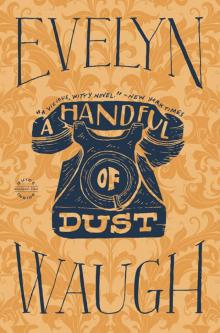 A Handful of Dust
A Handful of Dust Complete Stories of Eveyln
Complete Stories of Eveyln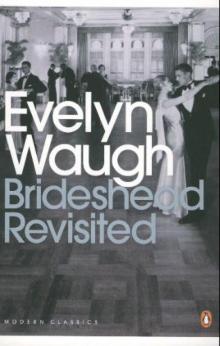 Brideshead Revisited
Brideshead Revisited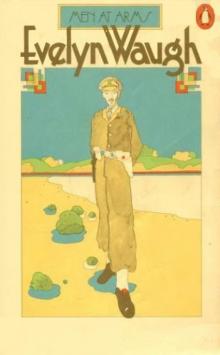 Men at Arms
Men at Arms Black Mischief
Black Mischief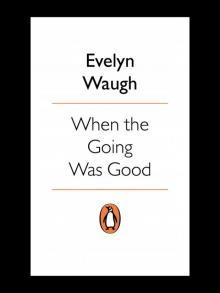 When the Going Was Good
When the Going Was Good Officers and Gentlemen
Officers and Gentlemen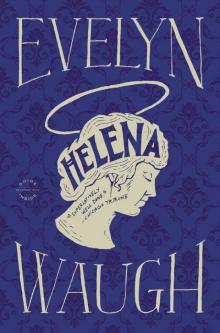 Helena
Helena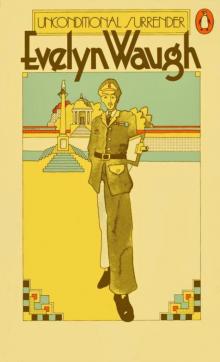 Unconditional Surrender
Unconditional Surrender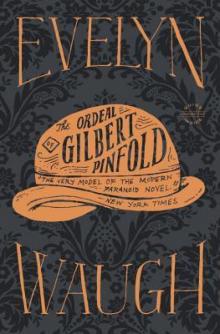 The Ordeal of Gilbert Pinfold
The Ordeal of Gilbert Pinfold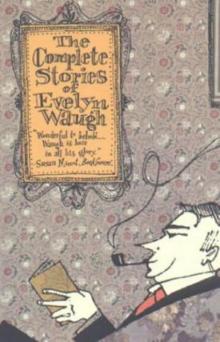 The Complete Stories Of Evelyn Waugh
The Complete Stories Of Evelyn Waugh